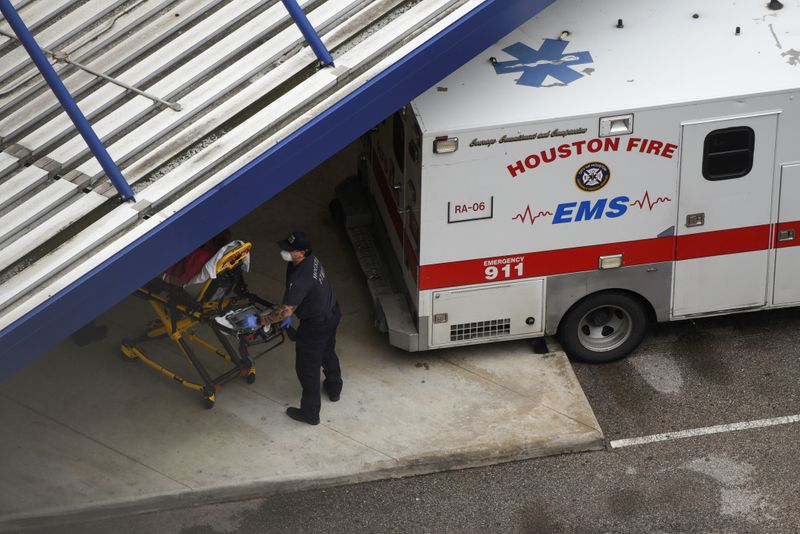By Gary McWilliams and James Oliphant
HOUSTON/WASHINGTON (Reuters) - Five states hit record daily highs for coronavirus cases on Saturday, and Vice President Mike Pence canceled planned campaign events in hard-hit areas as the virus surged in the U.S. South and West, halting economic reopening plans.
The number of confirmed U.S. cases of the virus rose to more than 2.5 million on Saturday, according to a Reuters tally. Over 125,000 Americans have died of COVID-19, the illness caused by the virus, the highest known death toll of any country in the world.
Florida on Saturday morning reported 9,585 new infections in the last 24 hours, a record for a second day, while Arizona recorded 3,591 new cases of COVID-19, matching its prior record on Tuesday.
Pence canceled planned events to campaign for President Donald Trump's re-election next week in Florida and Arizona out of "an abundance of caution," campaign officials told Reuters.
Meanwhile, Nevada on Saturday disclosed 1,099 new cases, double its previous record, while South Carolina and Georgia reported 1,604 and 1,990 new infections, respectively, also marking new daily highs.
The surge in cases has been most pronounced in a handful of Southern (NYSE:SO) and Western states that reopened earlier and more aggressively, serving as a warning to the potentially illusory nature of any perceived progress in controlling the virus.
For the third consecutive day, new U.S. cases rose by more than 40,000 on Saturday. The United States has now seen 2.52 million cases since the pandemic began, according to the Reuters tally.
The worsening contagion in some parts of the United States has created a split-screen effect, with New York and its neighboring Northeastern states, which were hit hardest initially, reporting declining cases and forging ahead with reopening plans.
Kami Kim, director of the Division of Infectious Disease and International Medicine at the University of South Florida, said her state's leaders claimed victory too soon after lockdowns were lifted starting in early May, while giving off conflicting messages on face coverings by not wearing masks themselves.
"It was just complete denial by a huge swath of the politicians," she said, predicting that the state may need to shut down again. "Unfortunately, our community still isn't taking it very seriously. People aren't wearing masks."
Washington state Governor Jay Inslee said on Saturday that his state would pause moving into the next stages of opening its economy as cases there rise.
In Texas, a state that was on the vanguard of letting people get back to work, Texas Governor Greg Abbott ordered bars across the state to close and required restaurants to limit indoor seating, acknowledging that in hindsight he had opened bars too soon.
Despite skyrocketing case numbers, both Abbott and Florida Governor Ron DeSantis have not bowed to pressure to issue statewide mandates on wearing masks, opting to leave that decision to local municipalities. Both Abbott and DeSantis are Republican, the same party as Trump.
Dr. Peter Hotez, dean of the National School of Tropical Medicine at Baylor College in Houston, said he fears that daily cases in the Houston area could more than triple to 4,000 by mid-July, making it the main global hot spot by then.
"We need to implement more aggressive social distancing measures now," the renowned vaccine scientist said.

At a briefing on Friday, DeSantis blamed the spike in infections on young people interacting more in the last few weeks, adding that they faced lower risk of dying than older people. Lending support to that view, Florida on Saturday reported 24 additional deaths, well off peaks in April when the elderly made up a larger proportion of cases.